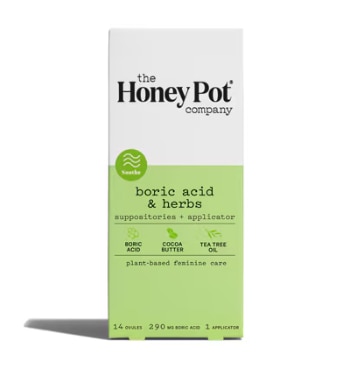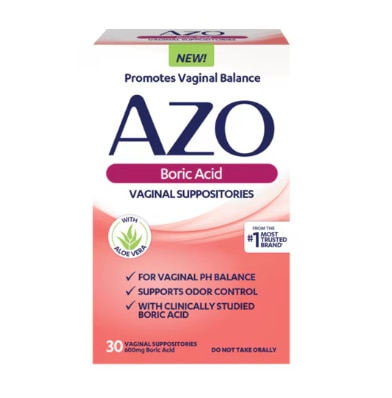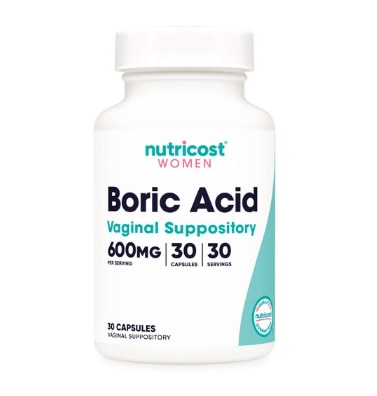Every drugstore has a feminine hygiene aisle stocked with colorfully packaged products ranging from menstrual cycle to yeast infections and everything else a woman might need for care down there. For many women, shopping on that aisle typically involves grabbing the same box of tampons they’ve used for years and moving along. So, you may not have noticed the increased popularity of certain vaginal products…until they’ve landed on your social media feed.
One such product—boric acid suppositories—may be trending, but it isn’t anything new. In fact, vaginal suppositories containing boric acid have been around for decades, says Staci Tanouye, MD, FACOG, a board-certified obstetrician-gynecologist in Jacksonville, Florida. Amassing views online, these suppositories leave viewers wondering: Does boric acid actually have a place in your vaginal care routine? Here’s what you should know.
What is boric acid?
Chemically speaking, boric acid is an acid of boron (hence the name). It’s a compound made from oxygen, boron and hydrogen, and it’s naturally occurring. It’s naturally found in ocean water, soil and plants. Today, it’s also used in a variety of consumer goods, including household cleaners, insect repellants, eye washes and more.
In the case of women’s products, boric acid is sometimes used in over-the-counter (OTC) vaginal suppositories. They’re inserted in the vagina similar to tampons, though they’re designed to dissolve on their own. It’s important to note that even though boric acid suppositories are sold OTC, they’re not regulated by the U.S. Food and Drug Administration (FDA), so any claims made by the manufacturers may not be backed by research.
Why are women using boric acid suppositories?
The real question is: Why are boric acid suppositories circulating on social media? Like many feminine hygiene products, they claim to balance pH and reduce odors. Since there’s some stigma surrounding this, it’s easy to understand why there’s increased interest in potential solutions. Let’s see what the research says.
Researchers conducted a survey among women who have purchased boric acid suppositories and found that purchasers likely utilize them to help with symptoms related to bacterial vaginosis. The survey also concluded that consumers report high levels of satisfaction with them.†
Consumer satisfaction is one thing; clinical evidence is another. Clinicians may use boric acid suppositories for some vaginal issues, one study found. And users experienced relief from discomforts, though researchers don’t yet fully understand why. It’s possible that boric acid may help by promoting proper acid balance in the vagina, according to the Cleveland Clinic.†
Even though boric acid is available OTC, Tanouye recommends consulting a healthcare provider before using it. It’s usually a good idea to defer to experts, especially when it comes to your health.
Is boric acid safe?
The safety of boric acid depends on how it’s used. In household cleaners and insect repellants, for example, it’s not safe to inhale boric acid or get it in your eyes, per the National Pesticide Information Center. When using those types of products, be sure to read the instructions and follow the label closely.
Vaginal products are a lot different, and as such, they have different instructions for use and safety. Suppositories containing boric acid shouldn’t be consumed orally. They’re also not recommended for pregnant women.
As for the safety of vaginal boric acid suppositories, they’re likely safe for women with few reported adverse reactions, one review found. However, researchers drew attention to the fact that OTC boric acid suppositories may not be regulated, and they call for additional regulations surrounding them.
“Boric acid suppositories are generally well-tolerated,” Tanouye says, noting that there are some potential risks to know. “Overuse can lead to irritation and disruption of normal vaginal flora, which can lead to irritating vaginal symptoms,” Tanouye explains. So, casual use of boric acid suppositories to control odors may not be recommended. It may be best to leave them to the professionals and use them under their care.†
When in doubt, talk to your healthcare provider
If you’ve found yourself looking into boric acid suppositories, you’re likely interested in supporting your vaginal health. Wanting to take care of yourself is commendable, but Tanouye warns that self diagnosis and self treatment can get us into murky waters, especially when it comes to using unregulated OTC products.
It’s true that healthcare providers sometimes recommend boric acid, but as with any health care plan, there isn’t a one-size-fits-all approach. Not everyone interested in boric acid suppositories could benefit from them, Tanouye suggests. If you’re experiencing symptoms you suspect may be related to a vaginal infection, she recommends consulting a healthcare provider rather than taking matters into your own hands.
†These statements have not been approved by the Food and Drug Administration. These products are not intended to diagnose, treat, cure or prevent disease.




